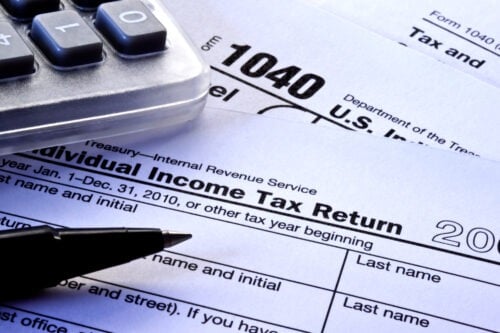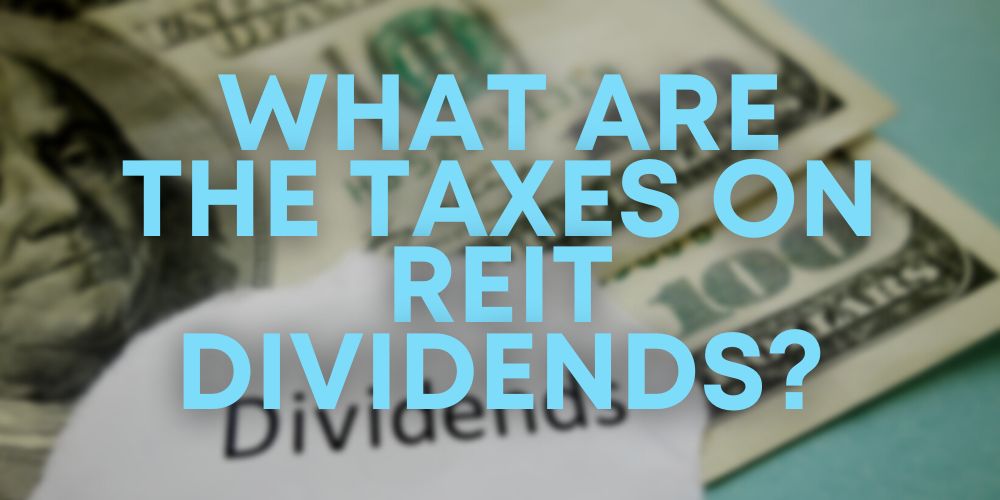REITs are a popular source of passive income; however, the tax treatment of their dividends is quite complex. As such, many investors want to know what taxes apply to REIT dividends. Keep reading for the full breakdown.
What Are the Taxes on REIT Dividends?
For investors based in the US, most real estate investment trusts (REITs) distribute dividends that are taxed just like ordinary income.

This implies a maximum tax rate of 37% (which is going up to 39.6% from 2023), with an additional surtax of 3.8%
However, taxpayers can deduct 20% of their combined qualified business income from their taxable income. The qualified business income includes qualified REIT dividends as well.
Adjusting for this, the maximum tax rate would be 29.6% on qualified REIT dividends. There are ways to bring it down even further.
Here are some conditions where the maximum tax burden can be reduced:
- If the federal tax rate of the individual is lower
- If the REIT distributes or returns capital gain
- If the REIT dividend is sourced from a taxable REIT subsidiary
- If the REIT is eligible to pay corporate taxes and therefore retain its earnings
In the last four scenarios, the maximum tax applicable on the relevant dividend amount would be 20% + 3.8% surtax.
Lastly, any sale of REIT shares is taxed as per capital gains, which is also 20% + 3.8% surtax.
Are REIT Dividends Double Taxed?
No, unlike other US corporations, ordinary REIT dividends are not subject to double taxation as long as they meet the requirements set out by the IRS.
Let’s back up a bit here to understand why this is the case.
REITs were first introduced by Congress in the 1960s in a bid to level the playing field between small investors and institutional investors in the commercial real estate space.
Before then, regular investors had no meaningful way to enter this market, as it required huge capital outlays.
The concept of a real estate investment trust was designed to help small investors pool their money to invest in commercial real estate.
In this way, they could benefit from the price appreciation and rental incomes that corporate offices and other commercial spaces generate.
To make sure that small investors were protected, Congress decided that the investments of these trusts were passive. It also put in place several other safeguards, such as limits on the number of shareholders and concentration of ownership.
But one of the biggest restrictions that was imposed was this: 90% of the net taxable earnings of a REIT have to be distributed back to its shareholders during the financial year.
To sweeten the deal a little bit for REITs, certain benefits were also afforded – the main one being that whatever they share as dividend distributions will not be taxed.
Specifically, they are allowed deductions of dividend distribution, while the investor gets taxed based on their regular income tax rate.
Both the REIT and the investor can benefit from this, and there is no double taxation, which is possible with other asset classes.
Do REIT Dividends Count as Income?
Yes, most REIT dividends are considered ordinary income. However, as these dividends are a type of pass-through income, up to 20% are deductible from your total taxable income.
This provision was recently introduced in 2017 under the Tax Cuts and Jobs Act.
Apart from this, there are two types of REIT distributions that are not counted as regular income: qualified dividends and return of capital.

Qualified distributions are incomes earned by the REIT through capital gains, and therefore these are liable for either short-term or long-term capital gains tax.
Secondly, if the REIT returns part of the original capital spent by the investor, then this is not taxable at all.
How are REIT Dividends Taxed if Reinvested?
Reinvested dividends are part of taxable REIT dividend income; they are neither deferred nor removed from the tax returns.
At the end of the year, the REIT will share form 1099 with details of dividends paid during the year, which will add to your total income tax liability.
However, while there is no income tax benefit, dividend reinvestment is a good way to benefit from the compounding of income, and there are many REITs that offer such reinvestment plans.
The dividend amount generated buys more shares for the investor at a nominal or sometimes zero cost.
Where Do REIT Dividends Go on a Tax Return?
There are three types of REIT dividends: Ordinary income distributions, capital gains distributions, and return of capital. Each has its own tax consequences.

REIT stockholders are sent a copy of their IRS form 1099-DIV each year. The form lets you know how much and what type of dividends were paid to you throughout the year.
Each of the boxes contains a different type of payment.
- Box 1a: Ordinary income dividends
- Box 1b: Qualified dividends in Box 1b
- Box 2a: Capital gains distributions
- Box 3: Return-of-capital
1099-DIV also carries instructions on the reporting of each of these types of payments on the tax returns form.
Box 1a income is ordinary dividends, and you pay income tax as per the regular income tax structure.
Out of this, Box 1b incomes are qualified dividends, which get taxed at the capital gains tax rate. Note that Box 1b income is part of Box 1a and needs to be subtracted from it.
Next up, Box 2a contains capital gains. Typically, you will have to pay taxes on capital gains at either short-term or long-term rates depending on the holding period.
However, REIT investors always file it under long-term capital gains.
Lastly, Box 3 incomes are a return of capital, which is non-taxable income.
Why are REIT Dividends so High?
As mentioned, REITs are legally obligated to distribute 90% of their taxable income to shareholders as dividends.
Thus, their dividend payouts are considerably higher than other asset classes, such as securities.
However, taxable income deducts things like depreciation and amortization, which are not actual cash outflows; therefore, REITs do have some cash on hand left for reinvestment.
Are REITs Worth It?
Yes, REITs are worth investing in. They offer excellent long-term performance, a regular source of passive income, and a solid vehicle to diversify a portfolio.
REITs have offered composite returns of nearly the same level as the S&P 500 over the last 45 years. Composite returns include both price appreciation and dividend income.

Secondly, these securities pay out dividends every quarter, offering a regular source of income to the investor, which can be beneficial for certain investor classes such as retirees.
Again, REITs offer diversification from a pure securities-based portfolio. Real Estate is an excellent hedge against rising inflation, a time when stocks have traditionally done poorly.
Therefore, having REITs in your asset allocation hedges the portfolio from inflationary shocks.
Final Thoughts
REIT taxation is slightly more complex than other types of assets, but once you understand the different classes of dividend income, it is not too hard to understand it.
There are three main types of returns: regular dividend income (which includes qualified dividends), capital gains, and return of capital.
Regular dividend income gets taxed as per the investor’s marginal tax rate. Qualified dividends and capital gains are taxed as per the capital gains tax rates.
Lastly, the return of capital is non-taxable and is simply the REIT returning your initial capital.
You might also like:
The 4 Best Cell Tower REITs To Buy Now
These Are The 9 Best High Yield REITs For Income To Buy Right Now!
The 8 Best Mortgage REITs To Buy Right Now!
These Are The 10 Best Residential And Apartment REITs To Buy For Income!


 Tags:
Tags:










